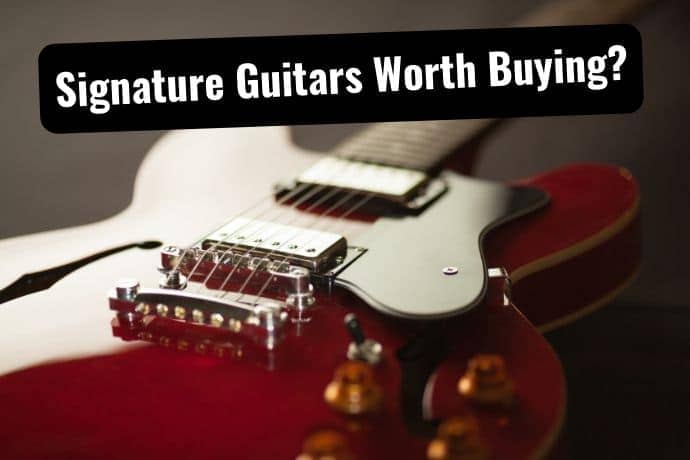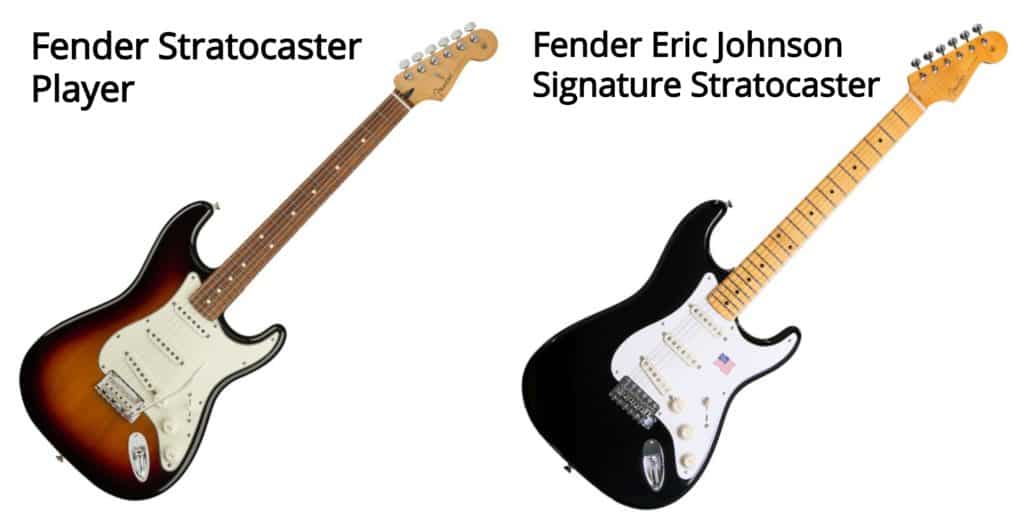
Like many of us, our guitar hero’s signature sound maybe inspired us to pick up and learn the guitar in the early days? (for me it certainly did!)
And with any famous guitarist, likely they have a ‘signature guitar’ on sale to buy. I must admit, signature guitars are pretty cool to stare at online or at any local guitar store!
But you may be wondering… are signature guitars worth buying? Are they overpriced? Do they hold their value over time? And ultimately, are they worth the purchase compared to a standard model?
What You Will Learn
Luckily, I have done some extensive research bringing you this complete guide to knowing everything about signature guitars.
I highly advise reading this guide if you are considering adding a shiny new signature guitar to your collection.
So let’s get into the main topic…are signature guitars worth it?
The Short Answer
A signature guitar is worth buying if you feel the specifications, build-quality, sound, and overall value is enough to justify the usual inflated price compared to the standard model. Alternatively, you can easily re-create a high profile guitarists signature sound without the artists signature guitar.
What Are Signature Guitars
A signature series is a special limited edition guitar manufactured from a guitar company (Gibson, Fender, Epiphone, Jackson, etc) based on a high profile guitarists specifications, sound, look and technical design.
It is essentially when a high profile guitarist collaborates with a guitar company they are commonly known to play.
Producing a signature series based on that famous player for the general public to buy and own. Some examples of these are…
Eric Johnson Signature Fender Stratocaster
Joe Bonamassa Signature Gibson Les Paul
Jim Root Fender Telecaster
Dave Gilmore Fender Stratocaster
Synyster Gates Schecter Synyster Standard
Matt Heafy Epiphone Les Paul
Buckethead Gibson Les Paul
John Mayer PRS Silver Sky
Eric Clapton Signature Fender Stratocaster
The list goes on…
Signature Guitars Based On Famous Records
Not only are signature guitars based on the artist’s name, but some models are also produced and recreated based on the guitars they played on iconic albums.
For example, Gibson released the AFD (Appetite For Destruction) Les Paul Model in 2010. An accurate copy of the Les Paul replica that Slash used on Guns N Roses legendary debut album in 1987.
As you can see the concept of a signature guitar is a pretty cool one. They can certainly be a head-turner if you happen to own one and are a ‘one of a kind’ guitar.
Signature Guitar Downsides
Signature models are classed as premium guitars, therefore are commonly on sale for a premium price way out of the affordable bracket. Some signature series can go for up to $5000 new.
Some of the contrasting opinions from the guitar community about signature series are they are: overpriced, unoriginal, and somewhat pointless for the ‘working man’ guitarist.
Which brings me to the next point…
Are Signature Guitars Worth Buying?
This is a difficult question to answer! It entirely depends on many factors which you will have to decide for yourself….
- Your budget and the price of the signature guitar
- Does the guitar have upgraded specs worthy of the price tag?
- Can a regular model produce the same sound?
- Can a cheaper model save money to upgrade other aspects like pickups, hardware, amplifier, effects, etc?
- Does the guitar have good resale value?
- Do you want to essentially play ‘someone else’s’ guitar?
let’s look at some examples…
First Example…
Let’s weigh up a Gibson Les Paul Classic vs a Gibson Les Paul Anaconda Burst Slash Signature.

The Gibson Les Paul Classic retails for around $2000 new whereas, the Anaconda Slash Gibson Les Paul retails for about $4000 used!
As cool as the Slash signature model is. the guitar is essentially a Gibson Les Paul with some upgrades compared to the Les Paul Classic.
Including Slash’s Seymore Duncan pickups, a fancy paint job, and a few specific tweaks such as neck profile, fret width, hardware, etc all to that specific artist’s preferences. Also, don’t forget a famous name and brand on the headstock!
In this example, if you want the core tone of Slash? You can save yourself some money and purchase a Les Paul (Gibson or Epiphone) with a good set of Seymore Duncan pickups and a good Marshall tube amplifier.
The rest is down to your playing! A signature guitar is not going to make you sound anymore like the artist.
In this example, I don’t think this signature guitar is worth the hefty price tag although I love the concept of a Slash Gibson Les Paul.
Second Example
Lets pair up a Fender Stratocaster Player (Made in Mexico) vs the Fender Eric Johnson Stratocaster

A regular Mexican Stratocaster retails for about $650 whereas the Eric Johnson Stratocaster retails for about $2000.
Wow, over 3 times the price for essentially the same guitar besides a few upgrades in materials and specifications.
Ok I admit, the Eric Johnson signature is the manufactured in the USA significantly increasing the price and value compared to the Mexican made Stratocaster.
Sure the USA Eric Johnson Strat perhaps has slightly better tone, specs and build quality but is it a $1350 difference? I would have to say a no in my personal opinion.
However, this is not to say that all signature guitars do not offer good value.
Last Example
The Squire Jim Root Telecaster retails for $400. For this price, you get a Telecaster with passive high output pickups (not EMG), mahogany body, and a maple neck to name a few specs.
$400 for a signature Telecaster with high output humbuckers is a good deal. It would cost a similar amount to buy a regular Squire Telecaster and customize it with humbuckers including the cost of the pickups and labor to fit them.
This example does offer good value for money from a signature model.
Pros & Cons of Signature Models
Pros
- Unique and ‘one of kind’ guitar to add to the collection
- Limited edition
- Premium guitar
- Could become a rare ‘collector item’ in the future
- Will hold its value and not massively depreciate overtime
Cons
- Most are wildly overpriced
- Even affordable brands inflate the price
- Not getting much more for your money than the standard models
- Risking taking an expensive guitar to a gig if it gets broken or stolen
- Not an instrument you would use for originality
- Why would you want to use someone else’s guitar?
Why Are Signature Guitars So Expensive
There’s are several reasons why signature guitars are expensive additions to any guitar player collection compared to the standard models. We can break them down into 4 main reasons…
Cost of Labour
Some signature models such as the David Gilmore Fender Stratocaster is a carbon copy of his iconic original black Fender Stratocaster. Known as “The Black Strat!”
David Gilmore spoke about the great challenges Fender went through to produce replicas of these guitars.
It would have taken lots of resources and labor to replicate the guitars fine details such as every ding, scratch and worn paint on the body and neck. This can add a lot of ‘man-hours’ onto the production of the guitar adding overall cost when they go on sale.
Therefore the company has to raise the price to ensure they make a tidy profit from its production and sale of each guitar.
Also the fact that a limited amount of these is manufactured (less than 100 for example.) Meaning a good profit margin has to be made from each guitar. The David Gilmore Signature Stratocaster is on sale for a rather eye-watering $5000!
Premium Specifications
Signature models adopt the artists preferred specifications whether it is their signature pickups, neck material, wood material, binding and technical specifications such as neck profile and premium paint job.
All these small premium specs add a lot of cost onto the overall guitar. Signature models usually do not use stock materials on the standard regular models.
Hence why they are seen as premium guitars and obviously on sale for a premium price. They are essentially custom shop guitars for that specific artist.
Location of Manufacturing
The majority of Gibson’s and Fenders signature models are manufactured in the US adding a hefty amount of dollar onto the price tag.
The reason is these are viewed as the premium manufacturers locations compared to other locations such as the Far East or other places like Mexico.
Whereas Epiphones signature guitars are manufactured in China or Indonesia which is considerably cheaper to produce than in the US.
Marketing
The law of ‘supply and demand’ is at work. Guitar companies will market signature guitars to the artists ‘number one fans’ slapping a hefty price tag in the process as the series is associated with a high profile guitarist.
Secondly, other marketing tools such as the term ‘limited edition’ is a persuasion technique to add demand onto the guitar which allows them to bump up the price and value of the guitar.
Also creating a limited batch of these guitars (say 100) adds demand to the guitar and another persuasion technique to part with your cash. Other costs for the company such as marketing and advertising the guitar can increase the price.
Do Signature Guitars Hold Their Value
Signature guitars hold their value similar to standard models. Like every guitar, it will depreciate slightly overtime whatever its price.
But there’s no evidence that signature models hold their value better than standard models.
Signature models may hold their value better way into the future as a signature guitar are more desirable than standard models in terms of collecting.
It also depends on that artist’s popularity at the time. It also depends on the brand on the headstock as vintage Fenders and Gibsons are more desirable than Epiphones and Squires.
Signature Guitars Worth More in The Future?
Some people have said that signature models can be worth more way into the future and even make some money.
But you will be taking a long time anything up to 100 years! But it is hard to predict plus, I’m no financial expert here.
But some solid advice I would give is to not buy a guitar as an investment because guitars are not like real-estate.
Guitars are bad investments to make money from them. You simply buy a guitar because of its sound, look or feel not because you want to make money from it as a business venture.
Final Thoughts
Any signature guitar is one of a kind and unique. However, it entirely depends on what side of the fence you are. Some questions you have to ask yourself are…
- Is the value worth the price?
- Are the guitar’s specifications and upgrades worth the price?
- Will you get the use out of it?
- Can you capture your desired sound using a standard model?
- Are there affordable alternatives?
As cool as signature guitars are as a concept, I would rather use a standard model and use the money to upgrade other features such as pickups or hardware.
Or I would use the money for other better gear such as amps and effects which don’t forget is another large portion of your sound.
Thanks For Reading
If you enjoyed this post I suggest you read “Cheap Guitar Pedals vs Expensive Pedals” my comparison post explaining the differences between affordable and boutique pedals.
